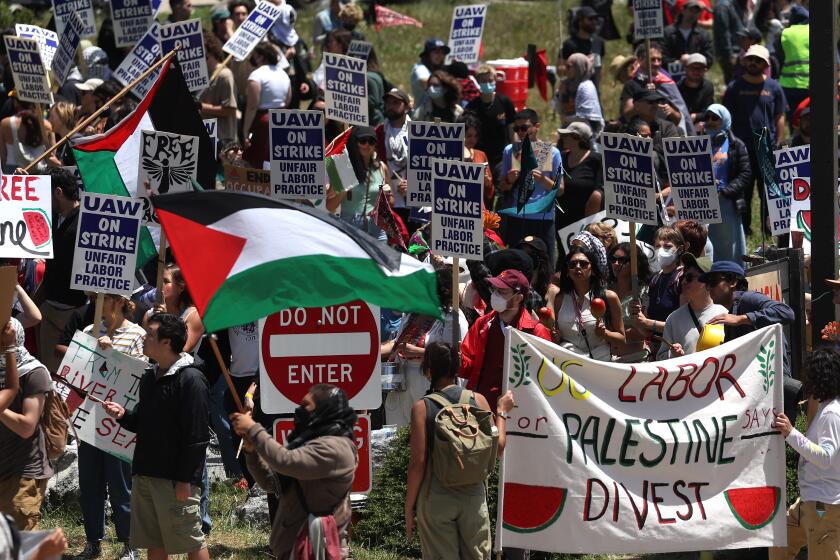Police arrest dozens of pro-Palestinian protesters at UC Santa Cruz
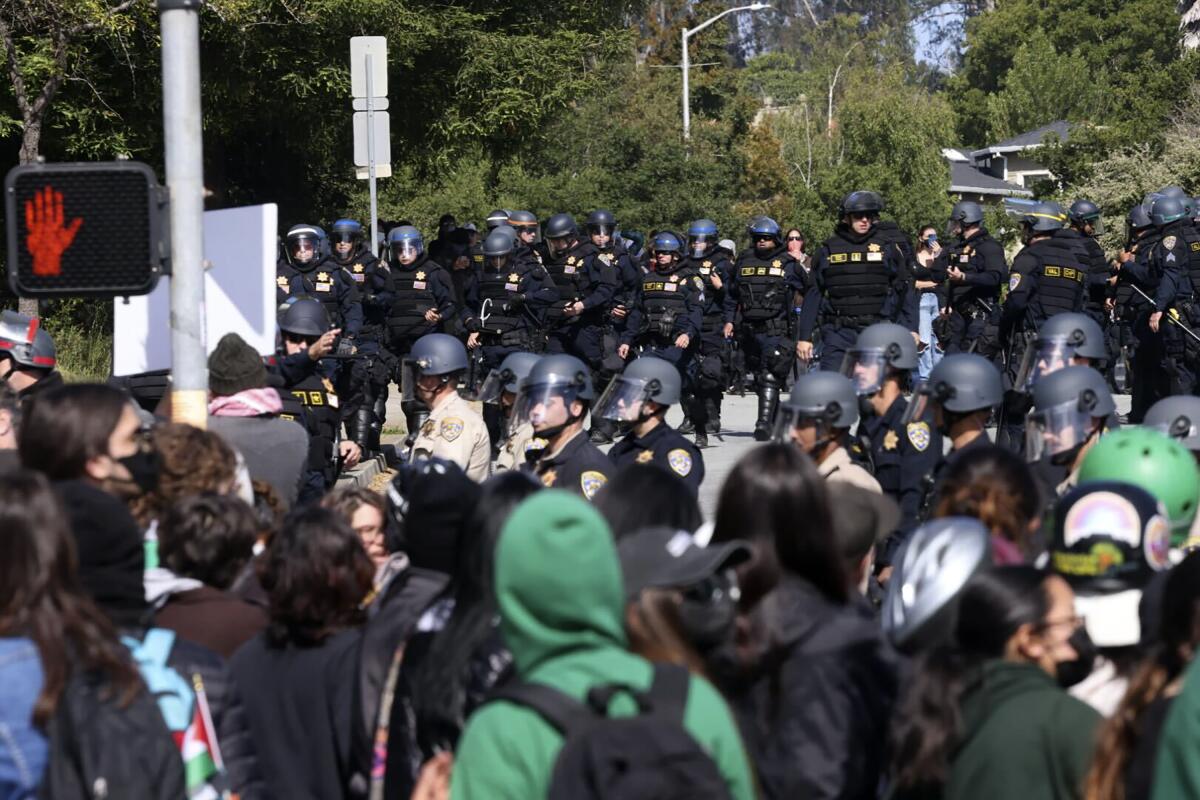
- Share via
Police in riot gear entered the UC Santa Cruz campus early Friday morning, arresting approximately 80 pro-Palestinian protesters who set up an encampment and blocked the main entrance to campus.
Video taken after midnight showed a line of police with raised batons standing at the UC Santa Cruz encampment just a few feet from protesters who linked arms. Many protesters wore helmets and goggles and covered their faces with keffiyehs and masks.
“Leave the area immediately,” a law enforcement officer instructed protesters. But his instructions were drowned out by the crowd.
“Cops off campus!” the demonstrators chanted. “Glory to the martyrs!”
One of the arrested students said Friday afternoon that officers beat her and other students with batons.
“They smashed a baton into my ribs and chest — and that was not a one-off, they did it repeatedly,” said Laaila Irshad, 20, a UC Santa Cruz student and organizer with Students for Justice in Palestine. “They were just using brute force.”
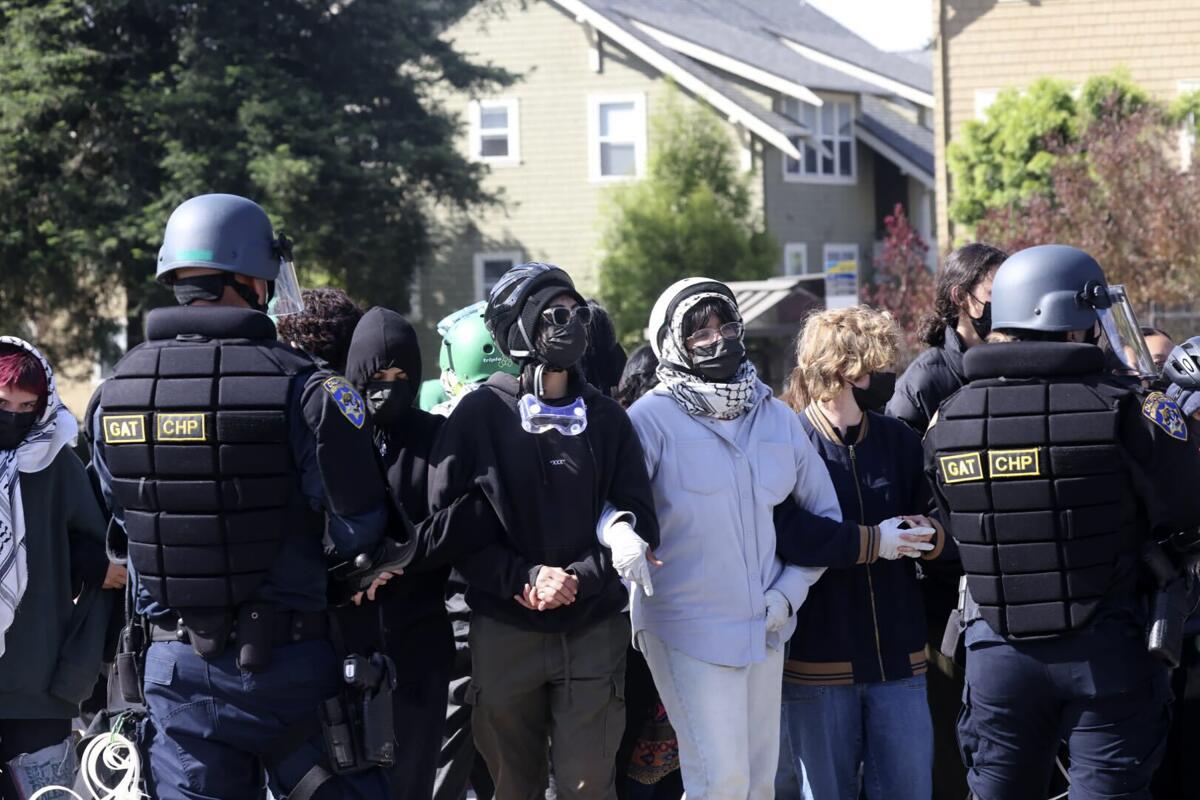
Irshad, who was released Friday afternoon with a citation for failure to disperse, said one student had a concussion after hitting her head when a police officer pulled her to the ground.
After the students were zip-tied and arrested, Irshad said, they were kept in a bus for more than two hours before they were taken to a processing center. They were not allowed to use the bathroom, she said, while they waited for three hours.
By 2 p.m., dozens of students had been arrested — but the extraordinary long showdown between police and protesters continued.
Some students who had been arrested, like Irshad, returned to the encampment area — taking pains to avoid stepping on university property to comply with a condition of their release: that they stay off campus for two weeks.
“The encampment is not over,” Irshad said as she stood across the street watching police face off with protesters.”People are still trying to defend the encampment.”
The clash came as university leaders switched to remote learning this week after protesters blocked the main entrance to campus. Students have joined forces with hundreds of striking academic workers at UC Santa Cruz, who allege the University of California’s response to pro-Palestinian demonstrators has violated their free speech rights.
University officials said Friday they brought in law enforcement after protesters repeatedly ignored their instructions to stop blocking campus entrances.
“It is imperative that we restore full access to our campus and end other unlawful, unsafe actions as demonstrators continued to disrupt campus operations and threatened safety, even delaying access of emergency vehicles,” said Scott Hernandez-Jason, the assistant vice chancellor for communications and marketing, said. “It was impossible to do so without law enforcement intervention.”
The standoff between protesters and law enforcement began around 1 a.m. as officers from the California Highway Patrol — some from as far away as Sacramento — descended on the encampment.
A livestream feed from Estudiantes Oaxaqueños de Ahora at UCSC showed protesters setting up wooden pallets between themselves and the officers.
“You don’t scare us!” they chanted. “Shame!”
Police tore away the barricade and then inched closer toward the protesters.
Livestreams from the UC Santa Cruz Student Union Assembly showed law enforcement descending on the encampment in the dark, shining strobe lights on students, looking inside tents and dismantling campers’ equipment.
“Free, free, free Palestine,” the protesters chanted, one waving a Palestinian flag as officers approached a line of protesters.
The unique demands made by UC academic workers union have labor experts debating over how the widely watched strike could come to an end.
Police could be seen on livestreams making an arrest around 3 a.m. Two hours later, the protesters were still at the encampment, issuing calls for supporters to come to the campus and provide backup.
“SHOW UP NOW,” Students for Justice in Palestine UC Santa Cruz said on Instagram. “5AM AND WE ARE STILL HERE. WE ARE STRONGER TOGETHER. GET HERE BY ANY MEANS NECESSARY.”
Videos from the scene showed protesters screaming as police officers scuffled with protesters who resisted arrest, in one case pulling a student from the crowd by the leg. Students tried to pull those being arrested back in to their circle.
“Don’t hurt students!” the protesters chanted. “Don’t hurt students!”
About 7:30 a.m., a white bus carrying protesters left campus and the crowd jeered.
“Let them go!” they chanted.
It was not clear exactly how many protesters have been arrested. Inquiries to local law enforcement agencies were not returned.
In a Friday morning note to the campus community, UC Santa Cruz Chancellor Cynthia Larive urged students and faculty to avoid the area, saying some demonstrators remained at the main entrance after law enforcement removed the encampment and the barricade.
Larive also warned that there would be more law enforcement on campus.
“This decision was not made because individuals demonstrated,” Larive wrote. “It was because they have chosen to do so through unlawful actions. The road blockades, with fortified and chained barricades made of pallets and other materials, and other unlawful actions disrupted campus operations and threatened safety, including delaying access of emergency vehicles.”
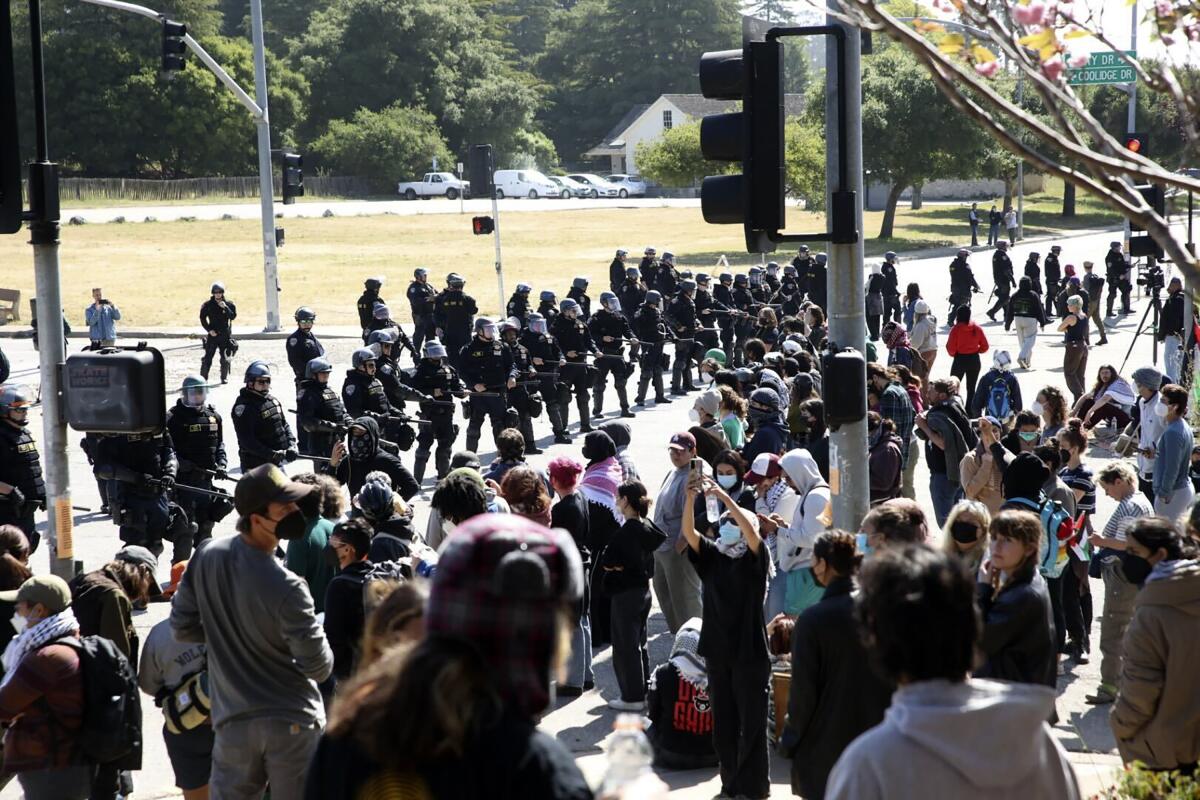
Larive cited a “particularly worrisome incident.” On Tuesday, she wrote, an emergency medical vehicle was prevented from entering a facility in which a toddler was in distress.
Throughout negotiations with the school, Larive said, protesters had refused to compromise and made demands that contradicted the university‘s mission. They insisted the college pull out of relationships with organizations that support Jewish students, divest from companies affiliated with Israel, and condemn the use of funding from certain federal agencies.
“Functionally, the encampment wanted to prevent our researchers from pursuing research related to topics with which they disagree,” Larive said. “This is a dangerous precedent and to give in to it would undermine academic freedom and make our academic community vulnerable to the values of whatever political force seeks to prevent free inquiry.”
Lauren, 18, a first-year student at UC Santa Cruz who was at the encampment until 4 a.m. and did not want to give her last name, said she felt disappointed reading the chancellor’s note.
“She’s saying these things that are going to protect her and her own interest, but she’s calling funding for Israel research,” Lauren said. “That’s not what it is. It’s funding a genocide. The language that she’s using, it’s very manipulative, and it’s very clever and manufactured in order to make her position look like the right one, when in 20 years they’re going to call students who were doing this, they’re going to call us brave.”
Lauren, who said she didn’t want her tuition dollars going to the war, said the university and police response only made her more committed to the cause.
“Their resistance, it only makes us stronger,” she said. “When we see members of our community being brutalized, it helps us channel more passion and empathy for our community.”
As the sun beat down on the protesters late Friday morning, a student documenting the conflict on her phone said she was exhausted.
“I’m not going to lie, guys, I’m falling asleep,” the student livestreaming for Estudiantes Oaxaqueños de Ahora at UCSC said as she sat on the road pointing her phone at law enforcement officers.
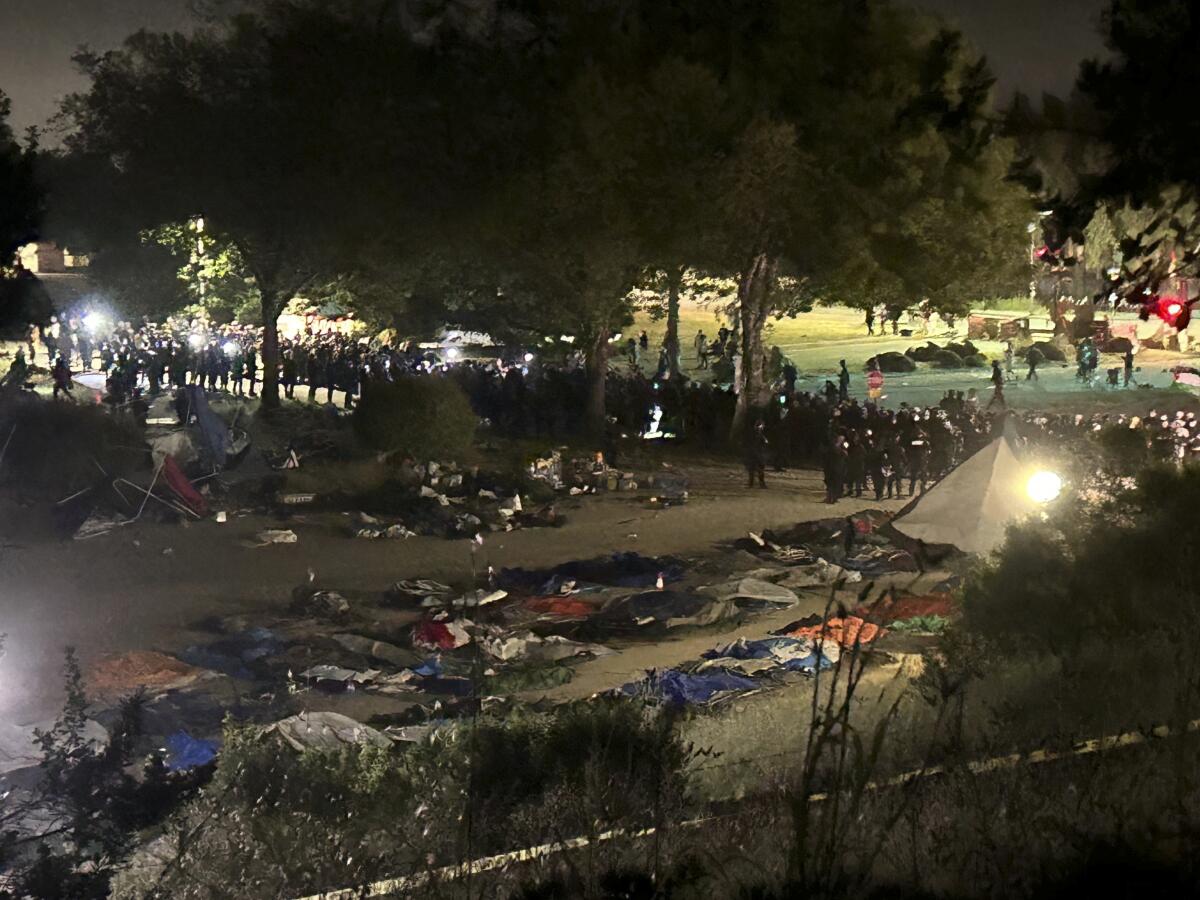
She had already been given a battery pack from a community member after putting out requests for a phone charger. But soon she stopped broadcasting.
Another livestreamer with UCSC Students for Justice in Palestine carried on, eventually retreating from the sidewalk to shelter under the shade of a tree.
“There is only one solution,” the protesters bellowed. “Intifada revolution!”
As the standoff continued, UCSC Students for Justice in Palestine issued a statement Friday afternoon on Instagram.
“The chancellor organized this violence against her students, and it will cost her legacy,” it said. “We will not forget.”
